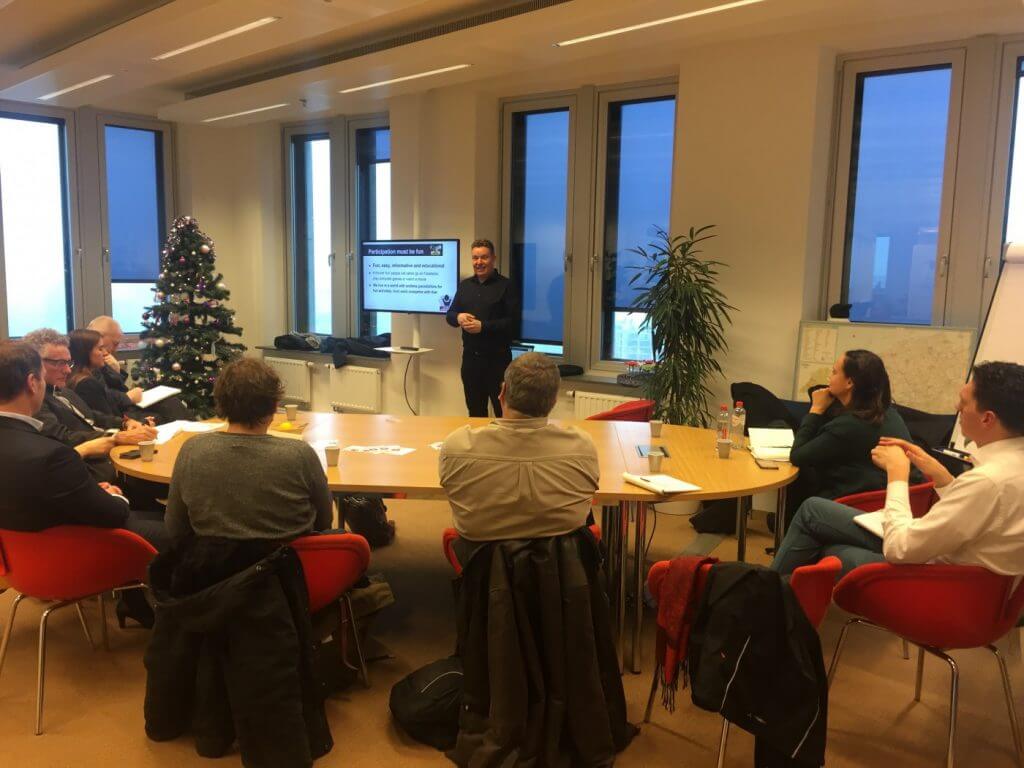Róbert Bjarnason is president and co-founder of the Citizens Foundation in Iceland. On the 13th of December 2016 Netwerk Democratie invited him to the Netherlands in light of our project with the Dutch Ministry of Interior and Waag Society to introduce and strengthen the use of open source participation tools in the Netherlands.

With the Citizens Foundation Bjarnason develops open source tools and methods to promote online, democratic debate and to increase citizens’ participation in their community in Iceland and worldwide. The key goal of the developed tools is to increase trust and help communities make better decisions. Below he shares with us some of his key insights.
Why is there according to you a need for digital tools in our current democracies?
Democracy is losing the trust of the people and that is a big problem. Our formal, official democracy is still being done mostly the same way as it has for hundreds of years. For most of that time our society changed slowly but that is no longer the case. In the last few decades our world has changed so much so fast that there are no precedents in our history. We live in unique times and therefore we face unique challenges.
Our democracy has not kept up with those changes and although it should not change too much too fast we can not allow it to be stuck in a fixed mould that fit our society a 100 years ago. Voting every four years made sense in 1917 with transportation and communication being what it was at that time but today is not sufficient on its own as is manifested in declining trust in democracy in many countries.
Compared to the situation in Iceland the use of digital tools is just starting up in the Netherlands. During your visit what did you experience as the most important and needed lessons that local governance here should learn in order to successfully implement e-tools like Your Priorities?
Start by doing co-created experiments with civil society and citizens. Then refine those processes and do more experiments. Use an agile and lean methodology, copy how successful Internet startups work.
Democracy is already slowly being upgraded, mostly by grassroots civic hackers working on the local government level with the best results when collaborating successfully with official authorities.
What is open source software and what does it mean for e-participation tools?
The Internet is built on open source software, most web servers, tools and browsers are open source today. The infrastructure of our digital democracy must also be open source and owned collectively. In the past decade a new movement of civic hackers has been born that promotes bottom up democracy, designed and operated by the people. The key element of this movement is open source software, where democratic innovators make their designs and software open for anybody to use or modify for their needs. Cities like Reykjavik, Madrid, Barcelona and many others have taken a firm stand with open source public democratic innovations.
So you agree with the statement that ‘tools used for democracy should itself be democratic’?
Yes, auditable open source and public code and servers are a critical key element in ensuring transparency and fairness which are basic requirements for trust. If our democracy will be hosted on closed and secret e-voting platforms owned, operated and controlled by corporations like Microsoft, Google or Facebook we are moving into a world of privatized democracy which will always have the interests of its owners at heart. As democracy moves online we must make sure that we can trust both the software and the processes and that control is in the hands of the people and their elected representatives.
The software of your tool Your Priorities is spreading all over Europe now. What can these European projects do to collaborate?
We encourage a model of decentralization where countries build up knowledge and experience of using open source software like Your Priorities locally. We don’t envision the Citizens Foundation being a centralized operator for democracy in different countries.
We can all keep working together through open source tools like Your Priorities by improving the code and the democratic methods. This way we learn fast through sharing and will be able to implement and upgrade our democracy at a pace with rest of society – in the same way that has enabled the Internet to grow so fast.
Is there a strategy on how to share knowledge among these different experiments? And what about the knowledge on implementing e-democracy tools, how can experiments turn their experience into sharable information?
This is an important issue and we have come up with an idea to tackle it. We propose creating a Digital Commons for Open Government. The plan is to create a highly automated marketplace for open source tools, open knowledge and relevant support services. We’ve also been working with the Council of Europe on a Democratic Incubator where sharing of knowledge is the key goal.
*The Dutch version of Your Priorities is now available at www.e-dem.nl and open for local use in agendasetting.*



